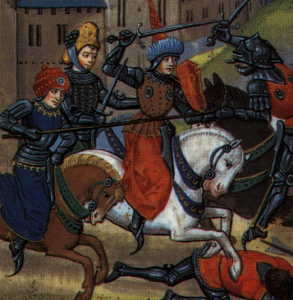|
Agnes Hotot,
Agnes Hotot Dudley and The House of Dudleys of Northamptonshire For a little more than a century after the Restoration of the 'Merry Monarch,' few families held a higher position in 'the land of spires and squires' than the Dudleys, baronets and lords of the manor of Clapton, near Thrapston, in the above-mentioned county. During the Civil Wars they had espoused the cause of royalty, and had shown their zeal by parting with much of their plate and jewels, in order to supply the personal wants of the unfortunate Charles, and, when his son came to the throne, they were among the favoured ones who were not forgotten. The young king entered London in triumph at the close of May, 1660, and the patent of baronetcy bestowed on William Dudley, Esquire, of Clapton, in the county of Northampton, bears date the 1st of August following. Sir William was the lineal descendant of the Suttons, one of whom had taken, as was usual, or at all events common, in such cases, the surname of Dudley on his marriage with Margaret de Somerie, the daughter and heiress of John de Somerie, by his wife, Hawise Pagnell, whose ancestors were Lords of Dudley at a date very soon after the Norman Conquest. Sir William had three wives; but he had children only by his third lady, a daughter of Sir Paul Pindar, Alderman of London, whose mansion still partly stands-though on its last legs in Bishopsgate Street Without. His son, the second baronet, was for many years member of parliament for his native county, and a Commissioner of the Customs; and as his grandson, another Sir William, proved to be the last of his line, the title expired with him in 1764. |
A Dudley Robin Hood ? CAPTAIN RICHARD DUDLEY
When Tangier was demolished, and all our forces werethen recalled from thence, Dick Dudley came into England at the same time ; but living here at a very extravagant rate, he could support himself in no manner of way but by taking on the road what he thought was a fair prize. The highway he quickly made his exchange, and would venture very boldly for what he got; but one time, being apprehended in London for robbing the Duke of Monmouth near Harrow-on-the-Hill, he was committed to the Poultry Compter, whither a man need not sail, for this prison is a ship of itself, where the master-side is the upper deck, and they in the common-side lie under hutches, and help to ballast it. Intricate cases are the tacklings, executions the anchors,
capiases the cables, Chancery bills the huge sails, a long term the mainmast, law the helm, a judge the pilot, a barrister the purser, an attorney the boatswain, his clerk the swabber, bonds the waves, outlawries sudden gusts, the verdicts of juries rough winds, and extents the rocks that split all in pieces. Or, if it be not a ship, yet this and a ship,differ not much in the building, for the one is a moving misery, the other standing. The first is seated on a spring, the second on piles. Either this place is the emblem of a bawdy-house or a bawdy-house of it, for nothing is to be seen in any room but scurvy beds and bare walls ; nevertheless it is a sort of a university of poor scholars, in which three arts are chiefly studied -- viz. to pray, to curse and to write letters. Dudley, breaking out of this mansion of sorrow and tribulation, not long after obtaining his liberty met with John Wilmot, Earl of Rochester, coming from his seat at Woodstock, and setting on his lordship and his retinue, which was his chaplain, a couple of footmen and a groom, he took from him above one hundred guineas and a gold watch. The chaplain then beginning to chastise Dudley for his unlawful actions, quoth he: " I don't think I commit any sin in robbing a person of quality, because I keep generally pretty close to the text, 'Feed the hungry and send the rich empty away " ; which was true in the main, for whenever he had got any considerable booty from great people, he would very generously extend his charity to such as he really knew to be poor.
After this exploit, Dick Dudley meeting Captain Richardson, the keeper of Newgate, on the road betwixt London and Tunbridge, in whose clutches he had been three or four times, he commanded him to stand and deliver; but Richardson refusing to deliver, withal threatening what he would do if ever he came into his custody again, quoth he: I expect no favour from the hands of a jailer, who comes of the race of those angels that fell with Lucifer from Heaven, whither you'll never return again. Of all your bunches of keys, not one hath wards to open that door; for a jailer's soul stands not upon those two pillars that support Heaven, Justice and Mercy; it rather sits upon those two footstools of Hell, Wrong and Cruelty. So make no more words about your purse, for have it I will, or else your life." Hereupon Captain Richardson was obliged to grant his request, and betwixt Dudley and the waters drinking at Tunbridge, went home as well purged and cleansed as a man could desire.
This daring robber had committed several most notorious robberies on the road with that famous highwayman on whom King Charles II. was pleased to confer the name of Swiftnicks, from his robbing a gentleman near Barnet about five in the morning, being come then from Bosom's Inn in London, and taking from him five hundred and sixty guineas. He rode straight to York, and appeared there on the bowling-green about six in the evening of the same day; and being apprehended and tried for the aforesaid robbery, before Judge Twisden, being acquitted of it, and the judge mistrusting something of the matter, after strictly examining him, Mr Nicks, otherwise called Swiftnicks, owned the fact when he was out of danger, and was made a captain in the Lord Moncastle's regiment in Ireland, where he married a great fortune, and afterwards lived very honest.
But at last, this country being too hot for Dick Dudley, upon the account of robbing General Monk, who had ordered a strict search to be made after him, he was forced to fly into France; from whence, travelling to Rome, he was in very great necessity indeed.
Not long after his arrival into this kingdom again, meeting with a Justice of the Peace on the road betwixt Midhurst and Horsham, in the county of Sussex, " Stand and deliver " was the language which he spoke to his worship, who, making a very stout resistance, shot Dudley's horse under him; but at the same time, being wounded in his arm, he
was obliged to surrender at discretion. Then the resolute highwayman, searching his pockets, out of which he took twenty-eight guineas, a gold watch and silver tobacco-box, next securing the magistrate's horse, quoth he : " Since your worship has previously broke the peace, in committing a most horrid and barbarous murder on my prancer, which, with my assistance, was able to get his living in any ground in England, I must make bold to take your horse by way of reprisal; however, I'll not be so uncivil as to let a man of your character go home afoot, for, for once, and not use it, I'll make one Justice of the Peace carry another." So, stepping into a field where an ass was grazing, he brought him into the road, and putting the justice on his back, as he was tying his legs under the beast's belly, quoth he: " I know I offend against the rules of heraldry, in putting metal upon metal, but as there's no general rule without an excep- tion, I doubt not but all the heralds will excuse this solecism committed in their art, which I look upon to be as great a bite and cheat as astrology." Thus taking his leave of the justice, his worship rode a very solemn pace, till the grave creature brought him safe into Petworth, where his worship had as many people staring at him as if he had been riding through the town in triumph.
At last, Dick Dudley attempting to rob the Duke of Lauderdale, when riding over Hounslow Heath, he was con- quered in his enterprise, and committed to Newgate; and when he came to his trial at justice hall in the Old Bailey, above eighty indictments being preferred against him for robberies committed only in the county of Middlesex, he pleaded guilty. Then, receiving sentence of death, he was (though great intercession was made for his life to King
Charles) executed at Tyburn, on Wednesday, the 22nd of February, 1681, aged forty-six years.
|
|

Need a Website? We can build you one!
|





